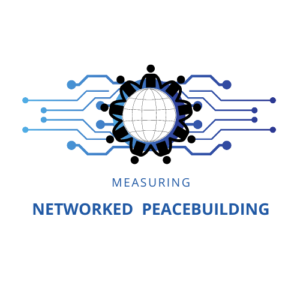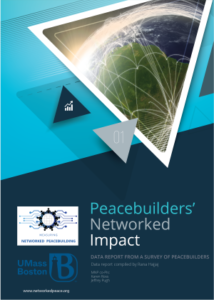Measuring networked peacebuilding
This page is a venue for sharing research findings and works-in-progress about Measuring Networked Peacebuilding, a collaboration between co-PIs Dr. Jeffrey Pugh and Dr. Karen Ross at the University of Massachusetts Boston. The collaboration explores the role of education/training programs and other factors in motivating and sustaining engagement in peacebuilding and social change activism through a three-phased approach:
- In Phase I, we created a database of nearly 200 peace- and conflict-focused international education (PCIE) programs around the world, and surveyed directors and other PCIE program staff to understand their overarching goals
- Phase II focuses on the experiences of current peacebuilders and social change activists: following the dissemination of a global survey, we are conducting life history interviews with peacebuilders and social change activists. Through this survey and interview data we aim to better understand the paths to engagement in peacebuilding and social change activism and the (potential) role of personal and professional networks in motivating and sustaining this engagement
- In Phase III, we are working directly with a small number of PCIE programs to disseminate alumni surveys; through these surveys and life history interviews with select program alumni, we are focused on exploring the specific role that education and training programs can play in building networks to motivate and support continued engagement in peacebuilding and social change activism.
Project publications and outputs
Rana Hajjaj, Karen Ross, and Jeffrey Pugh (April 2024). Peacebuilders' Networked Impact: Data Report from a Survey of Peacebuilders. UMass Boston Measuring Networked Peacebuilding project.
Allyson Bachta, Karen Ross & Jeffrey D. Pugh. (2023) "From Education to Peacebuilding: Exploring the Role of Networks in Peacebuilding Work," Ch. 20 in Stacey L. Connaughton & Jasmine R. Linabary, eds. Are We Making a Difference? Global and Local Efforts to Assess Peacebuilding Effectiveness. Rowman & Littlefield Publishers.
Peace-and conflict-oriented international education and training programs (PCIE) are an increasingly important part of higher education, serving as an opportunity to internationalize curriculum, promote engaged learning, and strengthen students' global citizenship. PCIE can also serve as a source of social capital, representing an opportunity to build relationships that can lead to cooperative efforts in violence prevention and peacebuilding. Given this, we argue that both the content of PCIE programs and the network development they presumably help foster shape the quality and effectiveness of subsequent peacebuilding activity among PCIE alumni. In this chapter, we explore what is already known about whether, to what degree, and for what duration PCIE programs can enable formation of relationships that motivate continued peacebuilding work and present initial results from empirical research about network formation in PCIE programs.
Jeffrey D. Pugh & Karen Ross, "Mapping the field of international peace education programs and exploring their networked impact on peacebuilding," Conflict Resolution Quarterly 37, no. 1 (2019): 49-66. https://onlinelibrary.wiley.com/doi/abs/10.1002/crq.21256
Conventional wisdom holds that international education builds cross‐cultural capacity, and evaluations of peacebuilding interventions point to significant impacts. Yet, little scholarship links these fields or explores the significance of networks of participants in either area for mobilizing transnational peacebuilding capital. We address this by examining how peace and conflict‐oriented international education (PCIE) programs enable construction of lasting alumni networks, and how these can contribute to longer‐term conflict prevention and peacebuilding activities after participants return home. We draw upon an original dataset of 178 PCIE programs and a survey of program founders and staff. [Data available here]
Jeffrey D. Pugh, “A Catalyst for Action: Training and Education as Networking Platforms for Peace Projects,” Journal of Peacebuilding and Development. 15, no. 1 (April 2020). Published via OnlineFirst. https://doi.org/10.1177/1542316619875122.
Training and capacity building are common peacebuilding interventions that represent potentially powerful platforms for change. However, there is a widespread assumption among many peace practitioners that teaching someone skills and increasing their knowledge of conflict resolution concepts will lead naturally to individual behavioral changes and aggregate into societal reductions in violence. The internal logic within this theory of change is often underspecified, assuming that increasing knowledge about how to resolve conflict effectively will make it more likely that participants will do so. Furthermore, most of the attention is focused on what to teach, rather than on who, or on how to build connections to ensure that, once trained, these participants have access to information, networks, and resources to be able to turn their knowledge and attitude changes into action. In this briefing, I introduce a framework that I call the catalytic network model, and illustrate briefly how it has worked in practice in an international education/training program: The Regional Institute for the Study and Practice of Strategic Nonviolent Action in the Americas, which took place in Quito, Ecuador. This program is an example of a growing number of international training and education programs, including study abroad, that increase knowledge and skills of participants in conflict resolution, prevention, and peacebuilding. I argue here that who is trained, the networks in which they are embedded, and how they stay connected to each other fundamentally influences their peacebuilding impact.
Jeffrey D. Pugh, “Weaving transnational activist networks: Balancing transnational and bottom-up capacity-building strategies for nonviolent action in Latin America,” Middle Atlantic Review of Latin American Studies 2, no. 1 (2018): 130-144. http://doi.org/10.23870/marlas.179
Latin America has been a laboratory for innovative strategic nonviolent action to confront oppression, corruption, human rights violations, and authoritarianism. One of the most salient explanations for why some movements achieve greater scale and effectiveness in meeting their objectives is the skills of movement organizers in unifying the population, planning strategic moves, and maintaining nonviolent discipline. The training and education to improve these skills often requires resources, transnational networks, and information sharing from external actors to complement the contextual knowledge, local legitimacy, and embedded institutional networks of local insiders. This essay proposes a model for international support of nonviolent action training and education that avoids the pitfalls of imposed liberal peacebuilding and colonizing hierarchies that could undermine movement legitimacy and expose activists to greater scrutiny and repression. In order to illustrate how the model works in practice, the essay examines the case of the Regional Institute for the Study and Practice of Strategic Nonviolent Action in the Americas.
[Spanish version of the article above:] Jeffrey D. Pugh & Adriana Rincon, “Tejiendo redes de activismo transnacional: el balance entre estrategias internacionales y locales en la construcción de capacidades para la acción no violenta en América Latina,” Middle Atlantic Review of Latin American Studies 2, no. 1 (2018): 145-160. http://doi.org/10.23870/marlas.194
América Latina ha sido por décadas un escenario primordial para la creación de innovadoras estrategias de la no violencia con el fin de confrontar la opresión, corrupción, violaciones a los derechos humanos y el autoritarismo. Una de las explicaciones fundamentales del éxito de ciertos movimientos en términos de alcance y efectividad en el logro de sus objetivos es la habilidad de quienes los lideran de unificar a la población, planear acciones estratégicas y mantener la disciplina de la no violencia. La preparación y el entrenamiento para mejorar tales habilidades implican recursos, redes transnacionales e información suministrada por actores externos, así como el conocimiento del contexto, la legitimidad local y las redes locales institucionales. Este ensayo propone un modelo de apoyo internacional de entrenamiento y educación en acción no violenta que evita caer en la trampa de imponer el modelo liberal de la construcción de paz y que desafía jerarquías colonizadoras que podrían poner en peligro la legitimidad de los movimientos y exponer a los activistas a mayor escrutinio y represión. Con el fin de ilustrar cómo este modelo puede operar en la práctica, este ensayo examina el caso del Programa Regional para el Estudio y Práctica de la Acción Estratégica No violenta en las Américas.
Previous related research by the Principal Investigators
Karen Ross, "Becoming Activists: Jewish-Palestinian Encounters and the Mechanisms of Social Change Engagement," Peace & Change 44, no. 1 (January 2019): 33-67.
Karen Ross and Ned Lazarus, "Tracing the Long-Term Impacts of a Generation of Israeli-Palestinian Youth Encounters," International Journal of Conflict Engagement and Resolution 3, no. 2 (2015): 116-135.
Jeffrey Pugh, "The Short-Term ‘Bridge Model’ Study Abroad Program: Peacebuilding in Latin America,” PS: Political Science & Politics 46, no. 4 (October 2013): 791-796.

